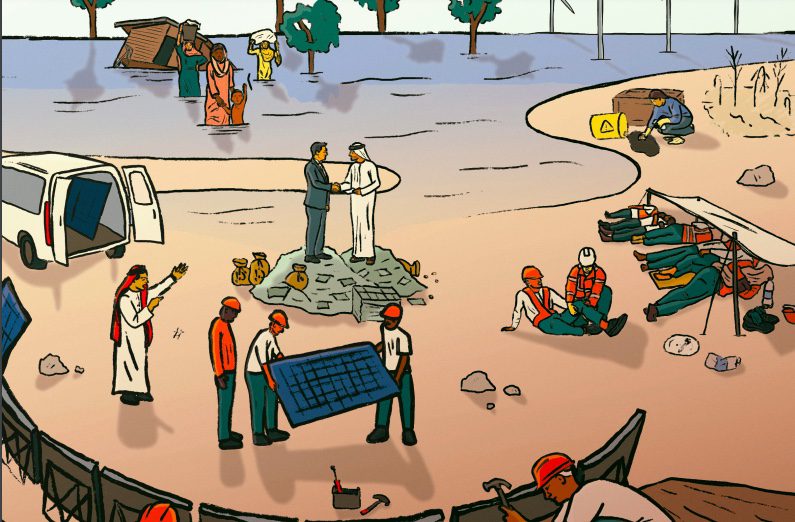
Unjust Transitions: Climate Migration, Heat Stress, and Labour Exploitation in the United Arab Emirates
Executive Summary
“The last place I worked was a pharmaceutical company. I had to leave my job because of rains and floods, due to which interior Sindh (Pakistan) basically drowned. Because of that, the company could not manage to sell their products anymore and I had to leave my job.”¹ – A Pakistani worker, Mohammed bin Rashid Al Maktoum Solar Park
“This job causes very serious health issues. Sometimes I am made to stand more than 10 hours in the scorching sun and this gives me a constant headache all the time. I have to take pain killers to cool it down which isn’t good for my health.”² – An East African worker, subcontracted for Siemens Energy
“I picked up a delivery from Diera City Centre at around 1 pm and was on my way to Naif. While nearing the area, I felt dizzy. I parked my bike. While taking out the bottle from the container, I felt awkward and collapsed. People around there carried me to the shade, sprayed water on my face, awoke me and brought me back to consciousness. The medics diagnosed that it was a heat stroke.”³ – An Indian worker, subcontracted for Talabat
“The division of work is based on racism. Most Africans are assigned more duties compared to the Asians and the Arabs. Only particular nationalities are promoted. We Africans are always in the junior positions year in and year out, even when we are more skilled than the Arabs. There is also wage discrimination.”⁴ – A South African worker, Mohammed bin Rashid Al Maktoum Solar Park
“After fuel prices increased, some Pakistani nationals protested, demanding that the company raise the per delivery rate. There were 300-400 Pakistani nationals protesting and they were all sent home.”⁵ – A Nepali worker, subcontracted for Talabat
Within the shining facilities at Expo City Dubai that will host the United Nations Climate Change Conference in November, internationally lauded solar and wind parks and a booming local gig economy, women and men from some of the poorest countries on earth are falling victim to an unjust transition. Migrant workers from Africa and Asia are being subjected to serious human rights abuses in the United Arab Emirates, a country whose oil and gas-powered economy is at the heart of the planet’s climate crisis. Practices include working in extreme heat and other occupational health and safety risks, nationality-based discrimination, lack of opportunities for promotion, exploitative hiring practices, understaffing and overwork, wage theft, workplace violence, overcrowded accommodations, inadequate food allowances, and inadequate channels for workers to seek relief from these violations.
Read or download the report here
